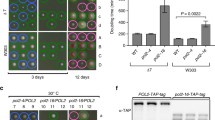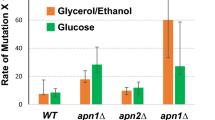Summary
We show by deletion mutagenesis, followed by in vivo and in vitro analysis, that the binding of a protein factor to the upstream activation sequence (USA) of the Saccharomyces cerevisiae glycolytic gene PYK, encoding pyruvate kinase, is required for efficient transcription of the corresponding coding region. In addition, gel electrophoretic mobility shift and DNase I protection studies, involving yeast gene products expressed in E. coli, suggest that this trans-acting DNA-binding protein is encoding by the RAP1 gene. The identification of RAP1 binding sites located within the UAS element of the yeast PYK, PGK (phosphoglycerate kinase) and ENO1 (enolase) genes, and in the 5′-upstream region of the ADHI (alcohol dehydrogenase) gene, suggests that a mechanism of coordinate gene expression involving several of the glycolytic genes may exist in yeast.
Similar content being viewed by others
References
Andrews BJ, Beatty LG, Sadowski PD (1987) J Mol Biol 193:345–358
Baker HV (1986) Mol Cell Biol 6:3774–3784
Bender A, Sprague Jr GF (1987) Cell 50:681–691
Bennetzen JL, Hall BD (1982) J Biol Chem 275:3018–3025
Birnboim HC, Doly J (1979) Nucleic Acids Res 7:1513–1523
Brand AH, Micklem G, Nasmyth K (1987) Cell 51:709–719
Buchman AR, Kimmerley WJ, Rine J, Kornberg RD (1988a) Mol Cell Biol 8:210–225
Buchman AR, Lue NF, Kornberg RD (1988b) Mol Cell Biol 8:5086–5099
Burke RL, Tekamp-Olson P, Najarian R (1983) J Biol Chem 258:2193–2201
Chambers A, Stanway C, Kingsman AJ, Kingsman SM (1988) Nucleic Acids Res 16:8245–8260
Chambers A, Tsang JSH, Stanway C, Kingsman AJ, Kingsman SM (1989) Mol Cell Biol 9:5516–5524
Clifton D, Fraenkel DG (1981) J Biol Chem 256:13074–13078
Cobianchi F, Wilson SH (1987) Methods Enzymol 152:94–110
Cohen R, Holland JP, Yokoi T, Holland MJ (1986) Mol Cell Biol 6:2287–2297
Dente L, Cesareni G, Cortese R (1983) Nucleic Acids Res 11:1645–1655
Fraenkel DG (1982) In: Strathern JN, Jones EW, Broach JR (eds) The Molecular biology of the yeast Saccharomyces: metabolism and gene expression. Cold Spring Laboratory, Cold Spring Harbor, New York, pp 1–37
Guarente L (1983) Methods Enzymol 101:181–191
Hamil KG, Nam HG, Fried HM (1988) Mol Cell Biol 8:4328–4341
Holland MJ, Yokoi T, Holland JP, Myambo K, Innis MA (1987) Mol Cell Biol 7:813–820
Huet J, Sentenac A (1987) Proc Natl Acad Sci USA 84:3648–3652
Kimmerly W, Buchman A, Kornberg R, Rine J (1988) EMBO J 7:2241–2253
Machida M, Uemura H, Jigami Y, Tanaka H (1988) Nucleic Acids Res 16:1407–1422
Maitra PK, Lobo Z (1971) J Biol Chem 246:489–499
McNeil JB, Smith M (1985) Mol Cell Biol 5:3534–3551
McNeil JB, Storms RK, Friesen JD (1981) Curr Genet 2:17–25
Messing J (1983) Methods Enzymol 101:20–78
Nishizawa M, Araki R, Teranishi Y (1989) Mol Cell Biol 9:442–451
Ogden JE, Stanway C, Kim S, Mellor J, Kingsman AJ, Kingsman SM (1986) Mol Cell Biol 6:4335–4343
Rine J, Herskowitz I (1987) Genetics 116:9–22
Sanger F, Coulson AR (1978) FEBS Lett 87:107–110
Sanger F, Nicklen S, Coulson AR (1977) Proc Natl Acad Sci USA 74:5463–5467
Shore D, Nasmyth K (1987) Cell 51:721–732
Stanway C, Mellor J, Ogden JE, Kingsman AJ, Kingsman SM (1987) Nucleic Acids Res 15:6855–6873
Uemura H, Shiba T, Paterson M, Jigami Y, Tanaka H (1986) Gene 45:67–75
Woudt LP, Mager WH, Nieuwint RTM, Wassenaar GM, van der Kuyl AC, Murre JJ, Hoekman MFM, Brockhoff PGM, Planta RJ (1987) Nucleic Acids Res 15:6037–6048
Author information
Authors and Affiliations
Additional information
Communicated by R. H. Haynes
Rights and permissions
About this article
Cite this article
McNeil, J.B., Dykshoorn, P., Huy, J.N. et al. The DNA-binding protein RAP1 is required for efficient transcriptional activation of the yeast PYK glycolytic gene. Curr Genet 18, 405–412 (1990). https://doi.org/10.1007/BF00309909
Received:
Issue Date:
DOI: https://doi.org/10.1007/BF00309909




